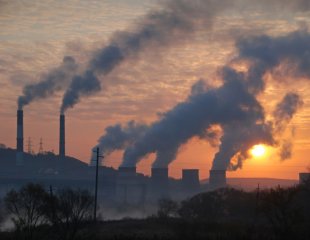Three Largest Meat Producers Rival Exxon in Greenhouse Gas Emissions
ENVIRONMENT, 11 Dec 2017
JBS, Cargill and Tyson emitted more greenhouse gas last year than all of France.
7 Dec 2017 – According to The Guardian, JBS, Cargill and Tyson—three of the world’s largest meat producers—emitted more greenhouse gas last year than all of France and nearly as much as the biggest oil companies, such as Exxon, BP, and Shell.
Hardly any meat or dairy companies publish their climate emissions, so it’s almost impossible to know the exact amount of greenhouse gas generated. But using the most comprehensive data from the Food and Agriculture Organization of the United Nations, The Guardian estimated emissions from animal agriculture, and the results are staggering.
The top 20 meat and dairy companies emitted more greenhouse gas in 2016 than all of Germany, Europe’s biggest climate polluter. This means if these companies were a country, they would be the world’s seventh-largest greenhouse gas emitter.
It’s impossible to take world leaders seriously when they fail to mention animal agriculture in addressing climate action. Raising animals for food emits more greenhouse gas than all the cars, planes, and other forms of transportation combined.
What’s more, according to the Food and Agriculture Organization of the United Nations, carbon dioxide emissions from raising farmed animals make up about 15 percent of global human-induced emissions, with beef and milk production as the leading culprits.
But simply by avoiding animal products, you cut your carbon footprint in half. Keep in mind that a pound of beef requires 13 percent more fossil fuel and 15 times more water to produce than a pound of soy. Additionally, a recent study found that switching to a plant-based diet reduces your personal carbon emissions more than replacing your gasoline-powered car with a hybrid.
There is no such thing as “sustainable” meat, and plant-based alternatives to meat, dairy, and eggs take a mere fraction of the resources to produce as their animal-based counterparts.
A vegan diet is not just good for the planet. It also spares countless animals lives of misery at factory farms. Pigs, cows, chickens, and other farmed animals suffer horribly. These innocent animals face unthinkable horrors: cruel caged confinement; brutal mutilations; and bloody, merciless deaths.
httpv://www.youtube.com/watch?v=THIODWTqx5E
________________________________________
Joe Loria is the communications and content manager at Mercy For Animals.
DISCLAIMER: The statements, views and opinions expressed in pieces republished here are solely those of the authors and do not necessarily represent those of TMS. In accordance with title 17 U.S.C. section 107, this material is distributed without profit to those who have expressed a prior interest in receiving the included information for research and educational purposes. TMS has no affiliation whatsoever with the originator of this article nor is TMS endorsed or sponsored by the originator. “GO TO ORIGINAL” links are provided as a convenience to our readers and allow for verification of authenticity. However, as originating pages are often updated by their originating host sites, the versions posted may not match the versions our readers view when clicking the “GO TO ORIGINAL” links. This site contains copyrighted material the use of which has not always been specifically authorized by the copyright owner. We are making such material available in our efforts to advance understanding of environmental, political, human rights, economic, democracy, scientific, and social justice issues, etc. We believe this constitutes a ‘fair use’ of any such copyrighted material as provided for in section 107 of the US Copyright Law. In accordance with Title 17 U.S.C. Section 107, the material on this site is distributed without profit to those who have expressed a prior interest in receiving the included information for research and educational purposes. For more information go to: http://www.law.cornell.edu/uscode/17/107.shtml. If you wish to use copyrighted material from this site for purposes of your own that go beyond ‘fair use’, you must obtain permission from the copyright owner.
